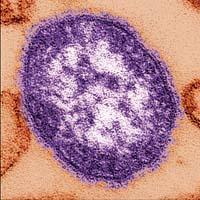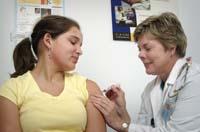Vaccination Vaccination Vaccination
2011/07/01 Galarraga Aiestaran, Ana - Elhuyar Zientzia Iturria: Elhuyar aldizkaria
 400
400
In recent months, cases of measles in Europe are growing. It is striking because a decade ago health officials believed that the disease was very close to being eradicated. For example, he collected the plan against the measles that Osakidetza launched in 2000.
Now, however, they are realizing that those forecasts were too optimistic. According to data published in May by the scientific journal Nature, in 2010 30,000 cases were collected across Europe, five times more than the average of the previous five years. Many of them were in Bulgaria, but subsequently the disease has spread to 33 other countries. Germany, Russia, Holland, Switzerland, Great Britain... This year, three out of four cases took place in France and also in Euskal Herria, especially in Gipuzkoa
"Some have been forgotten that measles can be very serious," said Rebecca Martin, in statements to the press on the occasion of the plague. Martin, secretary of the Office of Preventable Diseases for Immunization of the World Health Organization, believes that one of the causes of plague is that people are more afraid of the vaccine than of the disease and that therefore they refuse to get vaccinated.
However, the measles vaccine is very effective and safe. Rarely, health officials recognize that the vaccine has serious side effects (one in every million vaccinated causes encephalitis), but it has been fundamental to prevent the deaths of millions of children. In fact, in 1980, when the measles vaccine had not yet spread, 4 million children became ill worldwide every year, of which 2.6 million were killed. For 2009, cases of measles decreased by 95% in the world thanks to the vaccine.
As before, now
In fact, criticism of vaccines is as old as vaccines. Proof of this is the event that took place in Boston in 1901. Baztanga was causing many deaths and, to stop the plague, the authorities forced the entire population to vaccinate and punish those who refused.

The obligation of the measure provoked an attitude contrary to certain groups, when the President of the Health Council responded with a challenge: "If one of the leaders of the anti-vaccine groups wants to demonstrate their faith in the idea they have, I will give them the opportunity to express their beliefs, putting them in contact with marginalization, without being previously inserted." Dr. Pfeiffer maintained the challenge and moved to the hospital. There they contacted one hundred patients with smallpox.
Two weeks after that visit to the hospital, Pfeiffer confirmed its severity and published it in press: "Pfeiffer has a margin. Anti-vaccines may not survive." After that, in 1903 there were only a few cases of marginalization in Boston and in 1932 the last case was declared in that region.
Currently there are anti-vaccine groups that, among the arguments they give to explain their attitude, mention the obligatory nature. It is not, in general, the main argument. In fact, the first reason to reject vaccines is fear, especially because they can be harmful to health.
A clear example of this is the terror produced in Britain by the triple viral vaccine. This terror is based on a study published by doctor Andrew Wakefield in 1998 in the specialized magazine The Lancet. In the course of this study, he gave the conclusions of a study with 12 children from the Royal Free Hospital in London, in which the triple vaccine that protects from measles, pests and rubella was related to the risk of autism and other alterations. These children became ill after vaccination, suffered intestinal problems, and eight of them had behavioral problems, especially autism.
Suspicions are not evidence
This research received many criticisms: it was poorly done, the conclusions were totally wrong, it showed no causal effect... Subsequently, rigorous studies have been conducted to clarify the relationship between the vaccine and autism, without any indication that this relationship is true in any case. Finally, in 2006, The Lancet magazine and Wakefield itself had to apologize for the inaccuracy of research and for the confusion between researchers and society.

However, that scant publication was enough to provoke social reticence and strengthen anti-vaccine movements – it must be taken into account that The Lancet is a prestigious magazine. The media also spread the issue and, as a result of all this, many people refused to insert it. Thus, in some regions of Britain only 70% of the population is integrated, leaving thousands of people unprotected.
In fact, the percentage of people vaccinated under control should be 90-95%, according to the World Health Organization (WHO). When this is so, the degree of immunization of the group is sufficient to protect that small percentage that remains unvaccinated (there are few people who cannot be vaccinated because they have health problems and others who do not). On the contrary, when the percentage of grafts is lower, a risk of pests is observed.
This is what has happened now, that is, the percentage of population vaccinated against measles has not been enough to protect the entire population. The European Centre for Disease Prevention and Control has warned that, in particular, two age groups are at risk of getting sick. On the one hand, children who have not been vaccinated by decision or neglect of their parents, and on the other, adults aged 25 to 40 who had not received the vaccine because they had not received the vaccine in the program and had not become sick as a child. They are added even smaller children to get vaccinated, since with 15 months the first triple vaccine dose is put.
To address this situation, European health officials have taken special steps to isolate patients, prevent infections, and increase vaccinations. At the same time, strategies are being studied to make society aware of the importance of vaccines.
Strong trend trend towards strong trend
In fact, health officials are very concerned about the strength of the anti-vaccine groups. The Internet is the main tool to spread your ideas; as with other topics, web pages are an effective support to shape false and truthful arguments.
According to a study published by the specialized journal Journal of Medical Association ( Content and Design Attributtes of Antivaccination Websites ), the ten main arguments against the vaccines that appear on these websites are the following, from the most mentioned (on all webs) to the least cited (in more than half of cases, they cause idiopathic diseases, that is, persist the rights of unknown origin (the autograph).

Although this study was carried out in the United States, similar reasons are also explained in the European websites. And they are those who also listen to pediatricians, by the parents who refuse to vaccinate their children. According to the pediatrician, Carlos González, this type of parents are not many, but more.
According to data from the Ministry of Health of 2010, 95% of children follow the vaccination schedule. "This level of vaccination is adequate to protect the population," explains González. But in some areas there is danger: "Many of the parents who decide not to vaccinate their children have similar socio-economic characteristics and live in the same environment. Therefore, vaccination protection in these specific areas is too small, which can cause diseases".
Based on evidence
For Carlos González it is surprising how these parents are willing to believe on the Internet anything they have read or seen on television, so easy it is to prove that it is a lie. He says that on the Internet there are many investigations, for example, that override the relationship between triple vaccine and autism, and on the pages of official organisms they will also find the same. But it seems that people prefer to believe Wakefieldi and scammers like him. It is incomprehensible, but so it happens."
To deal with these false convictions, González has written a book entitled In defense of vaccines. The book analyzes one by one the most used false arguments against vaccines and provides scientific data and evidence that cancel them.

Among other things, it responds to those who say that vaccines are not necessary in industrialized countries. According to them, diphtheria, whooping cough, polio and other diseases have already disappeared, so their vaccination is not necessary. However, according to González, if the prevalence of these diseases is so low, it is due to vaccines. And if vaccinated, there is a risk of disease recurrence.
For example, when the Soviet Union is distributed, Eastern European countries had difficulties in maintaining their vaccination campaigns. As a result, in 1993, Russia suffered a diphtheria epidemic that caused 15,000 diseases and 470 deaths.
"Unfortunately, few diseases can completely disappear," said González. Baztanga is an exception. In fact, the baztango virus only affected people and needed the sick to live, it lived in them. Without the sick there is no disease. Most viruses, however, do not occur like this: they can be transmitted through animals or remain on the ground for long years. Therefore, vaccines are essential to control these diseases.
González has also responded to many other arguments in the book. Everyone seems important to him, but if he wants to highlight something he wants to make clear: "It is not true that at the age of vaccination children are still too small and they are given too many vaccines at a time."
He explains that the age of vaccination depends on two factors. If they get too soon, they are sometimes ineffective because "the childhood immune system still does not respond." If they get too late, you risk getting sick.
Therefore, delaying vaccination increases the risk of infection. "On the other hand, vaccines for the newborn's immune system are not excessive or excessive, contrary to what some believe. From the moment of birth, the child is colonized by all kinds of microorganisms, to which vaccines only add or die other microorganisms". And there are vaccines that are given at the same time because “together they have no more side effects than solo and is more practical. In addition, the puncture frequency of the child must be reduced."
Strategy for the future

In addition to Carlos González's book, in many other places expert answers can be found to false arguments such as the WHO website, in the immunization safety section ( Six common misconceptions about immunization ).
In addition, health managers are working on strategies to solve the problem. In the field of vaccination-preventable diseases, European and US experts agree on the view that these strategies should be directed to all levels involved in vaccination, that is, to parents, health personnel, the health system and producers of vaccines and the media.
In the case of parents, for example, mention four keys: inform, clarify, understand and cancel. In the case of health personnel, priority is continuous training and trust and safety in health managers and producers. Finally, the media is an essential tool for the dissemination of the value of vaccination programs.
Thus they hope to deal with the current paradox, that is, to resurrect the diseases controlled by having lost fear.



Gai honi buruzko eduki gehiago
Elhuyarrek garatutako teknologia





